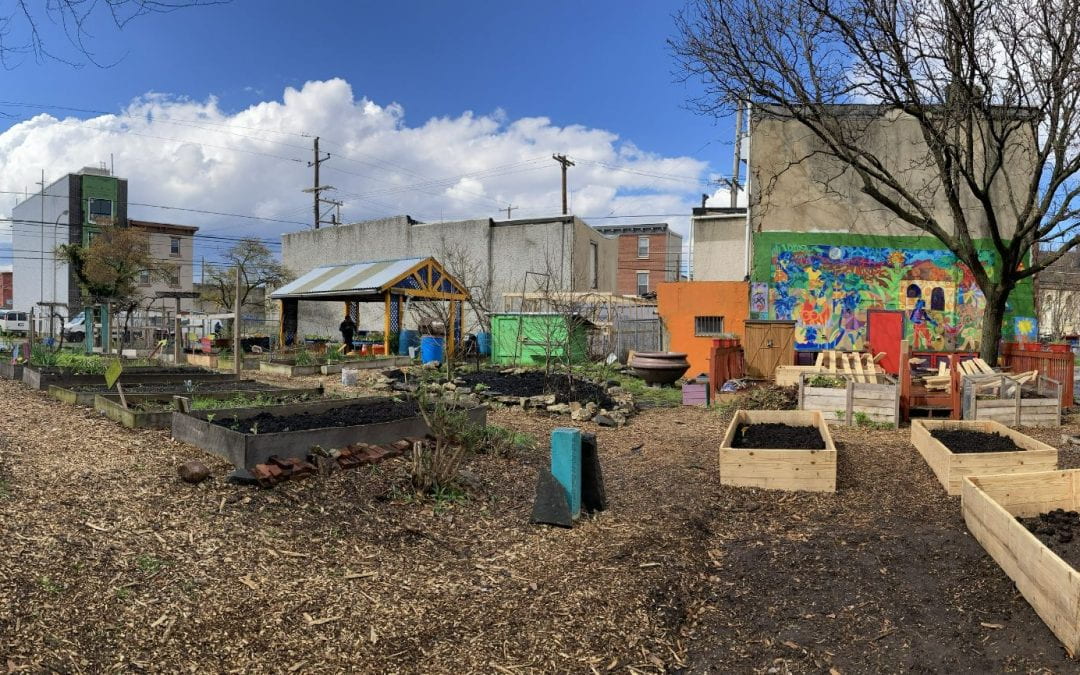On September 20th, Teresa Elliott joined us to discuss the intersection of urban agriculture and food sovereignty. As the executive director of the Norris Square Neighborhood Project in Philadelphia, Teresa has first-hand experience with creating food access through community gardening and food stands. NSNP has been successful in building community and promoting food justice by fostering a space for healthy and affordable food.
Teresa discussed the origins of NSNP, which began with a group of Latinx women, called “Grupos Motivos,” who knew gardening could bring people together to combat some community concerns. Before the project began, there was a high amount of drug use and trafficking in the area, but these women believed this space could improve where they lived, and the community around it. It did, indeed, and continues to support community action today. Members of the Dr. Ross Student Farm Club got to meet Iris Brown, a founding member of the “Grupos Motivos,” on an urban agriculture trip to Philadelphia last year and learned directly from her the powerful impact of community change.
Through a farm stand that runs every Saturday, NSNP provides food for those in the area. With a mix of culturally significant vegetables and fruits, and locally-grown options, the stand caters to the traditional heritage of the area while increasing food access. The younger participants run the stand, giving them the opportunity to gain working experience with the business side of food systems.
NSNP also provides raised bed garden plots for community members to rent, with soil, workshops, and mentorship available to help them grow their own food. Especially in an urban environment, having access to growing space and fresh local produce is difficult, and NSNP attempts to tackle this problem through these plots.
Teresa also talked about the difficulties with land space in an urban setting, mainly regarding funding and conflicts with developers. The project is home to various garden and gathering spaces, and one of their gardens was uprooted by a developer who was working on a neighboring property. The developer and his construction team destroyed the ground, several raised beds, and a fence that NSNP rightfully owned. In cities like Philadephia, land plots are often divided into tiny slots, and while these developers owned their slot, they needed an extra 15 feet to complete their project – 15 feet beyond their property that cut into NSNP’s slot. Not only was the damage devastating, but it took a lot of effort to get in communication with the developers and necessitated lawyers. There is a lack of care for the agriculture spaces by these outsiders, so those at NSNP, including Teresa, have had to put in a lot of work to keep everything running smoothly.

NSNP cares for people beyond being an area for food growth, including providing youth education services and gathering spaces. In the summer, they have a program for teenagers, where they engage in a wide range of activities, such as service projects, education, photography, art, college applications, and more, and they receive a stipend for their hard work.
NSNP also strives to connect generations, aiming to both honor the important contribution of the Grupos Motivos and acknowledge the importance of the future. They have had older community members cook with the younger ones, teaching them how to cook dishes
important to their culture. As stated earlier, the younger generation runs the Farm Stand, selling that food to everyone.
Overall, Teresa demonstrated some of the many benefits of community gathering and urban agriculture, and proved that NSNP had major successes in food access, justice, and sovereignty, despite some setbacks. We have created a list of other resources for those interested in learning more or getting involved:
Sources to learn more about NSNP and sustainability in food systems:
https://myneighborhoodproject.org/
- A unique organization that offers youth and community residents a safe space to explore culture and social-justice issues, create art, and develop their sustainable-agriculture skills. This is their official website where you can find everything you need to know from their history, to finding out how to get involved!
- A news story on the Norris Square Neighborhood Project
Holt-Giménez, E., & Wang, Y. (2011). Reform or Transformation? The Pivotal Role of Food Justice in the U.S. Food Movement. Race/Ethnicity: Multidisciplinary Global Contexts, 5(1), 83–102. https://doi.org/10.2979/racethmulglocon.5.1.83
- The global food crisis has pushed the U.S. food movement to a political juncture. A sixth of the world’s population is now hungry– just as a sixth of the U.S. population is ““food insecure.”” These severe levels of hunger and insecurity share root causes, located in the political economy of a global, corporate food regime. Because of its political location between reformist calls for food security and radical calls for food sovereignty, food justice is pivotally placed to influence the direction of food-systems change.
Podcast: Food & Justice w/ Brenda Sanders
- A weekly online video series and podcast that tackles issues of food access, environmental justice, health disparities, dietary racism, and other topics related to food and justice.
Recommended Books:
Animal, Vegetable, Junk: A History of Food, from Sustainable to Suicidal
- a passionate, informed look at the relationship between humans and food since early hunter-gatherer days, up to our current industrialized food system.
How to Kill a City: Gentrification, Inequality, and the Fight for the Neighborhood
- Peter Moskowitz’s How to Kill a City takes readers from the kitchen tables of hurting families who can no longer afford their homes to the corporate boardrooms and political backrooms where destructive housing policies are devised.

